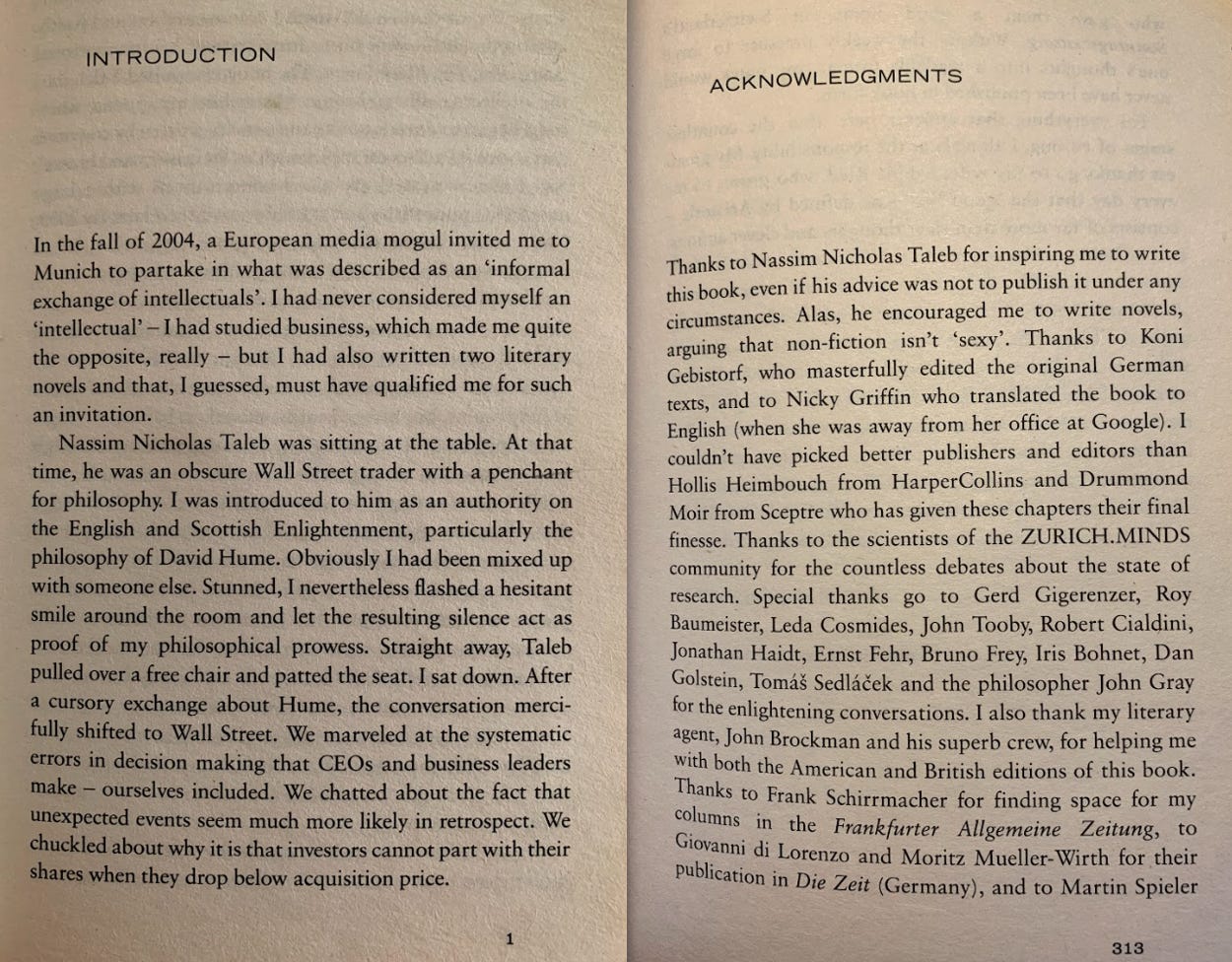I always wanted to write about this because I enjoy Dobelli’s books, and my gut feeling was that Taleb’s claim of Dobelli’s plagiarism damaged what little is left of justice. I’ve collected a few documents, including Dobelli’s related post and his open letter to Nassim, which are no longer available. To me, Taleb clearly overreacted, though the exact reason remains unknown. Why did it seem fishy? It’s simple. Here are the Introduction and Acknowledgements pages of The Art of Thinking Clearly as they appeared in the first edition. Does it seem plausible that a Swiss1 author, who mentions Taleb like this and refers to his works numerous times, would deliberately commit plagiarism in the manner Taleb described?
The longer your argument, the more guilty you are.
N. Taleb
I will keep it short. Taleb dedicated an entire webpage to criticizing Rolf Dobelli, yet remains silent about Lindyman, who plagiarized him in a far more blatant way by 'improving' the original text.
Anyway, my explanation is simple: Dobelli was clearly influenced by Taleb, writing about many similar ideas—most of which were not originally Taleb’s either. Dobelli wrote in German, by the way, and the claim reference was made to the English translation of the book. According to Dobelli, Taleb was the first to receive a galley copy and even supported the book’s launch. But it’s likely that Taleb endorsed it without actually reading it.
As for Taleb, I suppose you might feel insecure if you realize that someone else can write about the same topics with a similar level of popularity (at least in the niche of the ‘airport books’, Technical Incerto is out of question here).
Below is the best comment I’ve come across on this story, which, in full, deserves to be included here, from Michael Nielsen :
I stopped reading at Taleb's first example. I've seen very similar stories from both Richard Feynman and John Littlewood. Here's Taleb:
"I was thinking about calling my third cousin Antiochus this morning when the phone rang. Miracle! It was him on the other line; this confirms my developed sixth sense! This is a great omen except that perhaps I should wake up and take into account the number of times when I thought about calling him without his calling me; the times when he called me without my thinking about calling him; and, most significantly, the numerous occurrences of my not thinking about him, and him not trying to call me."
Feynman has several variations on this theme. Here's one:
"I remembered the time I was in my fraternity house at MIT when the idea came into my head completely out of the blue that my grandmother was dead. Right after that there was a telephone call, just like that. It was for Pete Bernays-- my grandmother wasn't dead. So I remembered that, in case somebody told me a story that ended the other way. I figured that such things can sometimes happen by luck--after all, my grandmother was very old--although people might think they happened by some sort of supernatural phenomenon."
And another:
"You know, the most amazing thing happened to me tonight. I was coming here, on the way to the lecture, and I came in through the parking lot. And you won't believe what happened. I saw a car with the license plate ARW 357. Can you imagine? Of all the millions of license plates in the state, what was the chance that I would see that particular one tonight? Amazing! "
There's an extended quote in the Feynman biography "Genius" (by James Gleick) which is a closer match than both these. […] Taleb basically reads as a reorganized and edited version of this last quote.
Edit: I couldn't resist reading on. Taleb's article is embarrassingly bad. Half his “original examples” I'd heard before from statisticians and other scientists, often years before Taleb's books. I will say this: there are a few instances in there where Dobelli should be genuinely embarrassed. But Taleb should be at least equally embarrassed by presenting, Wolfram-like, well-known truths as his deep original thought.
And the last point: I would rely on a court decision if Dobelli had committed a crime, but I don’t think there is any case to begin with.
I specifically mention Swiss nationality because I lived and worked there, and I had the pleasure of discovering a uniquely modest and honest culture that I haven’t encountered anywhere else. And my boss used to say, 'Every Swiss is a policeman.' :)




